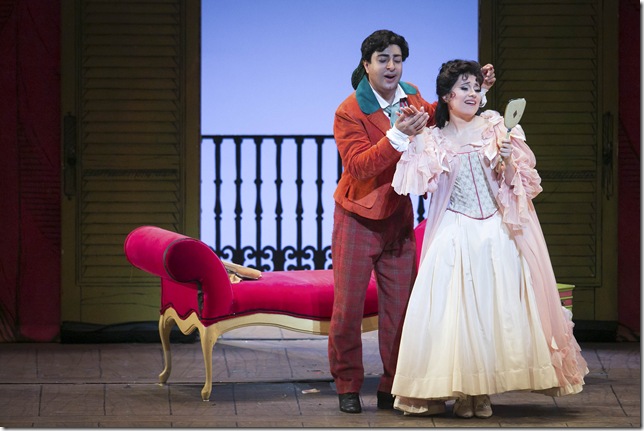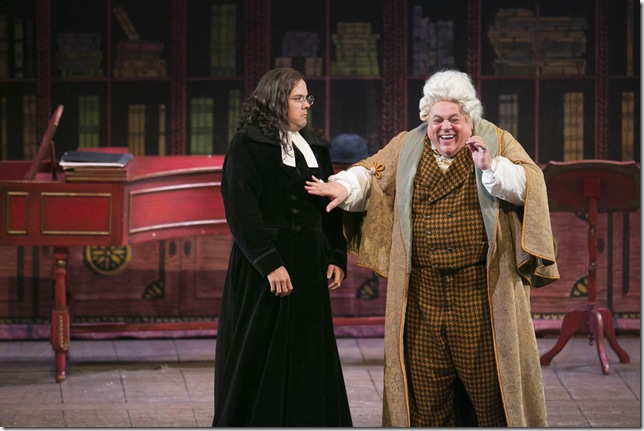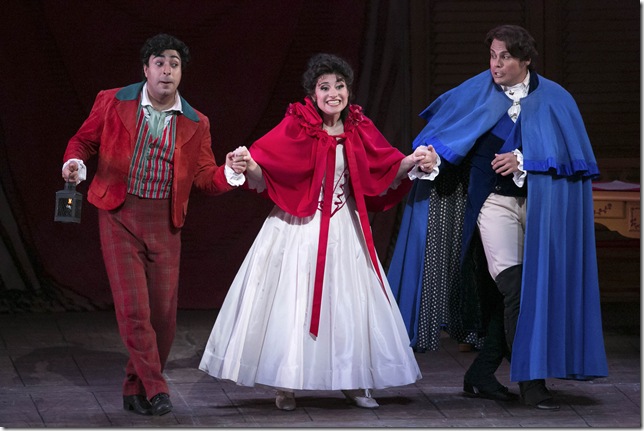There is a celebrated passage in Stendhal’s Life of Rossini in which the French writer describes an outing he and his friends took to Lake Como exactly 200 years ago, in the summer of 1814.
The party had a wonderful time on the road from Brescia to Como, and an even better time staying at the beautiful inn run by one of Stendhal’s other friends once they got there. That night, they went to the opening of a brand-new theater, where Rossini’s now-obscure Demetrio e Polibio was playing. They loved it: The music was so delectable that they were “transported — there is no other word for it,” Stendhal writes.
I’ve often thought of that passage when I go see bel canto opera from the first decades of the 19th century; I imagine that whatever the Como theater’s newness and pricey tickets, the production itself must have had a kind of homegrown coziness about it that undoubtedly made it ideal for a summer night in resort country.
And I thought of it again Sunday afternoon when I saw the final performance of Rossini’s great buffa masterpiece, Il Barbiere di Siviglia, in the Palm Beach Opera production at the Kravis Center. Here was a charming, winning mounting of this favorite comic opera, distinguished by its unpretentious but effective staging and its broad but not slapstick humor.
But most of all, it had singers. Real singers — musicians of excellent quality whose appearance all in one cast says good things about the kinds of performers the company is now hiring.
The Russian baritone Rodion Pogossov has played Figaro in four other productions, and the part fits him well. He is energetic and forceful without being manic, and he has a fine, strong voice that was delightful in the Largo al factotum and blended nicely with his colleagues in ensemble work.
He has an engaging, mischievous quality on stage that makes him a pleasure to watch and makes you happy to see him come back on stage. At the same time, Pogossov came off as a no-nonsense Figaro — which sounds contradictory, but not if one sees him, in this characterization, as the reliable floor manager of tomfoolery; this is someone you would trust with an impossible task and expect it to get done. It was a charming, musically adept performance from first to last.
As Rosina, the Italian mezzo Gaia Petrone was remarkable, portraying a tough-minded young woman who is nevertheless in the grip of infatuation, which makes for a nuanced performance that made her less a naïve damsel in distress and more of a very desirable but perfectly logical choice of romantic partner. Her singing that was especially notable: Trained in early music and a veteran of Baroque opera, she has a darkly colored, muscular voice with which she is able to traverse the considerable coloratura demands of this role with seeming ease.
In few other productions of the Barber I’ve seen over the past 20 years or so have there been Rosinas with whom I didn’t sympathize for the obvious effort they were making. But Petrone sounds natural and precise in this music, tossing off the 32nd-note fripperies with fluidity and style. She made it sound easy and normal; her Una voce poco fa was rhythmically exact, and in her Contro un cor, there was a sweetness that made the aria doubly attractive.
American tenor David Portillo, like Pogossov and Petrone making his Palm Beach Opera debut, was a splendid Count Almaviva. His large lyric tenor voice has a thrilling top, and when he sang the second serenade in Act I, Se il mio nome saper voi bramante, you could hear him really taking pride of possession in this beautiful little tune, adding a warmth and persuasiveness to the aria that sounded truly ardent.
He was a fine stage actor, too, funny and determined as the phony Don Alonso in Act II, and he is a handsome man, which helped make him believably dashing as Rosina’s intended, and apparently quite well-suited for her. Portillo also sounded as though the role held no vocal terrors for him, and he sang with prodigality and strength throughout.
The Italian baritone Bruno Praticò, who was Don Magnifico in last season’s mounting of La Cenerentola, has played Dr. Bartolo hundreds of times, and he is absolutely ideal in the role. He has all the fussiness, gullibility and cunning the character needs, and his voice has a crisp edge to it that makes Bartolo’s musical contribution worth paying more attention to.
But it as a comic that he is best enjoyed, and while he made sure to get all the laughs that were coming to him, he also didn’t overdo it. Two especially funny points came with him continuing to answer Don Alonso with the same noncommittal assent long after Alonso had stopped talking, and in another bit, answering a knock at the door in English — Who is knocking? — while the surtitles read the original Italian line (Chi é?). Like Pogossov, you loved to see him come back on.
Don Basilio was sung by the American bass Wayne Tigges, also making his company debut. This was a voice of exceptional quality, rich and powerful, as could clearly be heard in his La calunnia è un venticello. It would be wonderful to hear him in other roles, perhaps here in the 2015-16 season.
And as the maid Berta, mezzo Rachel Arky, a New Yorker who is a Young Artist with the company this season, sang her cameo aria, Il vecchiotto cerca moglie, with a pretty, firm voice (sounding a good bit younger, of course, than the middle-aged character), and in the ensemble pieces singing in the higher registers, where her voice was pleasantly reedy and quite strong.
French conductor Patrick Fournillier led a very fine Palm Beach Opera Orchestra with intensity and drive, adding a laudable sense of freshness to the proceedings. At times, he was insistent on a faster tempo in the concertato ensembles than his singers wanted to go, with a resultant pushmi-pullyu effect. And in the celebrated overture, the famous nagging minor-key motif was played pianissimo when it was echoed, an interesting effect that demonstrated Fournillier’s wish to bring thorough attention to every part of the score.
Fenlon Lamb’s direction was admirable and always diverting. She made good use of Minnesota Opera set Palm Beach Opera used for this production, with characters coming in and out of two side doors on either side of the stage, and during the overture, she did a smart thing by having the characters begin to appear, staring with Pogossov’s Figaro poking his head out of a giant portrait of Rossini.
Lamb also kept a tight rein on the funny business by not letting it get too madcap, and she included jokes like the soldier choristers in the final scene doing camp things like lifting their rifles for a few unison drum major sequences, and then launching into a somewhat stiff kick line.
The surtitles, credited to Christopher Mattaliano, were very Twitter-era, with one choral sequence rendered as “OK, we get it,” and in two other instances, exclamations of surprise were translated with the punctuation-mark collisions that are the accepted symbols in our country for four-letter vulgarities. It was a bit over the top, but the sold-out hall Sunday laughed with gusto.
The Washington Opera costumes looked smart and very much of their period, with Figaro and Almaviva dressed in early 19th-century style, while Bartolo was very much ancien régime, all of which subtly underlined the meta-message of the plot.
But the most encouraging thing was hearing all six of the characters with arias sing as well as they did, and blend as beautifully as they did. The comedic power of this opera is such that less-than-adequate singing can be tolerated for the sake of the laughs, but here was a cast that could really pull this difficult music off.
It raises high expectations for the kinds of singing we can expect from this company going forward, and it will have happened in an opera where you would expect to be carried away by the humor, and then found to your surprise that it was the musical performances that were going to do it instead.
The Palm Beach Opera presents an abridged production of George Frideric Handel’s Alcina tonight as part of its One Opera in One Hour series featuring the company’s Young Artists. The production stars Claire Kuttler (Alcina), Bridgette Gan (Morgana), JoAna Rusche (Ruggiero), Rachel Arky (Bradamante), Nicholas Nestorak (Oronte) and Peter Tomaszewski (Melisso). Fenlon Lamb directs, and the music is directed by Timothy Cheung. The free performance at CityPlace’s Harriet Himmel Theater begins at 7:30 p.m. For more information, call 833-7888 or visit www.pbopera.org.


